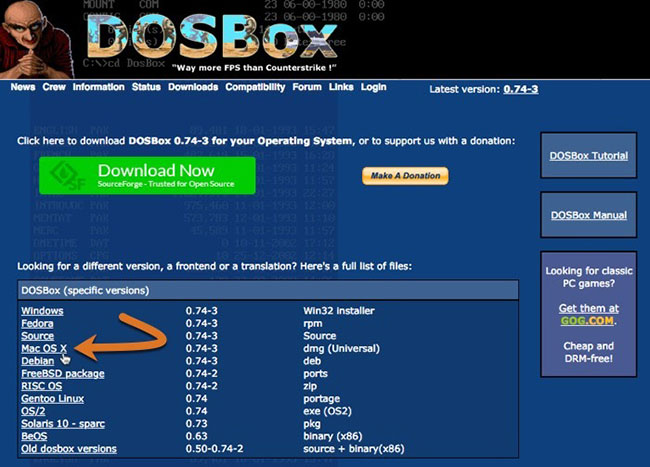Play old DOS games on macOS with DOSBox
In the olden days when the versions of Windows were called 9x, DOS soon became the dominant platform for PC gaming. Doom, Quake, Zork, etc. have used the original features of the operating system and created interesting games that can be played even by today's standards.
Although macOS is not well known for playing games, you can still play DOS games on Mac. Learn how to play DOS games on macOS with DOSBox, the leading DOS emulator on all platforms, through the following article!
Download and install DOSBox
1. Download DOSBox from the developer's website. Make sure you choose the correct version of Mac OS X. If you're not sure what to download, download DOSBox for macOS from Sourceforge.

2. Mount downloaded DMG in Finder.
3. Copy DOSBox.app to the desired directory, usually the Application s folder, but DOSBox can be run from any directory. You do not need to copy text files on DMG.
Front-end DOSBox
You can download a front-end for DOSBox on the same page. In this context, the front-end is an application that runs the emulation code of DOSBox, in a container. Usually, container applications extend functionality or simplify the process of loading and saving games.
Although it hasn't been updated since 2016 and doesn't work on Catalina, Boxer is still the most famous macOS front-end for DOSBox. Just drag and drop the game onto the application icon is done.
Run DOSBox and play game with DOSBox
Double click on the DOSBox icon to open a new DOS session. This will open a console window displaying a text-only interface.
If you're completely new to DOS, this confusing interface is called DOS Prompt. You run the commands by typing their names and targets, then pressing Enter , instead of using the mouse to interact with the graphical interface. This is an old style of computer use and may add some adjustments for modern users. Fortunately, running the game only requires a few commands.
Basic DOS commands
When navigating, it is helpful to remember these important DOS commands. Also, remember that DOS file names can only be 8 characters long.
cd directory: Change to the specified directory or path.cls: Clear screen.dir: Displays the contents of the current directory.help command: Displayhelp commandtext for the specified command.type textfile: Display the content of the text file.start filename: Opens the specified application in a new window and also works with the folders.
Mount the directory and launch the game in DOSBox
Before you can load a game, you will need to mount the directory in DOSBox. This links the mounted directory to the C: drive in DOS, allowing you to load files from that directory into DOSBox. C: is the location of the main hard drive in DOS, so this directory will be considered by the emulator as the main storage.
1. Use this command to mount directories in DOSBox:
> mount C /path/to/dos/games 2. Switch to drive C: by typing its name.
> C: 3. View the contents of drive C:
> dir 4. Navigate the directories using cd (change directory) command. Enter the directory of the game you want to play:
> cd SIMC2000 Launch an application by typing the name of the application and its extension. If you're not sure which application to run, try the EXE file with the same name as the application or the file titled START.COM.
> START.COM When the game starts, DOS Prompt will disappear and the game will take over the interface. Now, you can use the mouse if the game supports it.
To return to the DOS Prompt, exit the game. You may need to select an exit option from a menu.
Automatically mount folders
To shorten the process of launching the game, you can set DOSBox to automatically run the mount command on startup by editing the DOSBox configuration file.
1. Open the configuration file at '~ / Library / Preferences / DOSBox 0.74-3 Preferences' in TextEdit.
The exact name of the configuration file will vary depending on the DOSBox version.
2. Scroll to the bottom of the document. In the '[autoexec]' section , add your mount command. You can also add additional commands, with one command per line. When finished, save the file.

3. The next time DOSBox is launched, the mount command will automatically run.